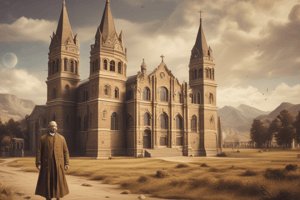Podcast
Questions and Answers
What are the two main types of sources historians use for research?
What are the two main types of sources historians use for research?
Primary sources and secondary sources.
Name one key characteristic that defines a historical period.
Name one key characteristic that defines a historical period.
Distinct social, political, economic, and cultural developments.
Why is contextual analysis important in historical research?
Why is contextual analysis important in historical research?
It helps historians understand the circumstances surrounding events and their impacts.
How does studying history contribute to developing empathy?
How does studying history contribute to developing empathy?
Explain the significance of cause and effect analysis in historical studies.
Explain the significance of cause and effect analysis in historical studies.
What is source criticism and why is it necessary in historical research?
What is source criticism and why is it necessary in historical research?
Describe the gradual transitions between historical periods.
Describe the gradual transitions between historical periods.
In what ways does engagement with history cultivate critical thinking skills?
In what ways does engagement with history cultivate critical thinking skills?
What role do archaeological findings play in historical analysis?
What role do archaeological findings play in historical analysis?
What is the overall benefit of learning from past mistakes and successes?
What is the overall benefit of learning from past mistakes and successes?
Flashcards
What is History?
What is History?
The study of past events, especially human affairs, encompassing a wide range of topics from human origins to modern global issues.
Primary vs. Secondary Sources
Primary vs. Secondary Sources
Primary sources are firsthand accounts created during the time period being studied, such as diaries, letters, photographs, or artifacts. Secondary sources are interpretations of these primary sources.
Key Aspects of History
Key Aspects of History
Chronology is the order of events in time. Cause and effect analysis explores how events are interconnected, while interpreting human behavior involves understanding motivations and actions within social contexts.
Historical Periods and Eras
Historical Periods and Eras
Signup and view all the flashcards
What Defines a Historical Era?
What Defines a Historical Era?
Signup and view all the flashcards
Transitions Between Eras
Transitions Between Eras
Signup and view all the flashcards
Historical Research Methods
Historical Research Methods
Signup and view all the flashcards
Types of Historical Sources
Types of Historical Sources
Signup and view all the flashcards
Context and Bias in History
Context and Bias in History
Signup and view all the flashcards
The Significance of History
The Significance of History
Signup and view all the flashcards
Study Notes
Overview of History
- History is the study of past events, particularly in human affairs. It encompasses a wide range of subjects, from the origins of humankind to contemporary global issues.
- Historians analyze primary sources (first-hand accounts) and secondary sources (interpretations of primary sources) to reconstruct and understand the past.
- Key aspects of history include chronology, cause and effect analysis, and interpretations of human behavior and societal development across different eras and cultures.
- Historical analysis involves critical thinking, synthesis of information, and evaluation of different perspectives.
Historical Periods and Eras
- Historical periods are broadly categorized into various eras, such as prehistory, ancient history, the Middle Ages, the Renaissance, the Age of Exploration, the Enlightenment, the Industrial Revolution, and more recent times.
- Each period is characterized by unique social, political, economic, and cultural developments.
- Transitions between periods are often gradual shifts rather than abrupt changes in societal structures and values.
Historical Methods
- Historical research uses a rigorous methodology that involves source criticism, close reading, and contextual analysis.
- Historians use diverse sources to create narratives and perspectives on the past, including written documents, oral histories, archaeological findings, and material culture.
- Analyzing the context of events and their effect on various social groups is crucial in historical investigation.
- Critical evaluation of sources is essential to avoid bias and ensure accuracy in historical accounts.
Historical Significance
- Studying history provides insights into societal evolution and human behavior.
- It allows us to learn from past mistakes and successes to improve the future.
- History fosters empathy and understanding for diverse cultures and perspectives.
- Engagement with history develops critical thinking, problem-solving, and communication skills.
Studying That Suits You
Use AI to generate personalized quizzes and flashcards to suit your learning preferences.




